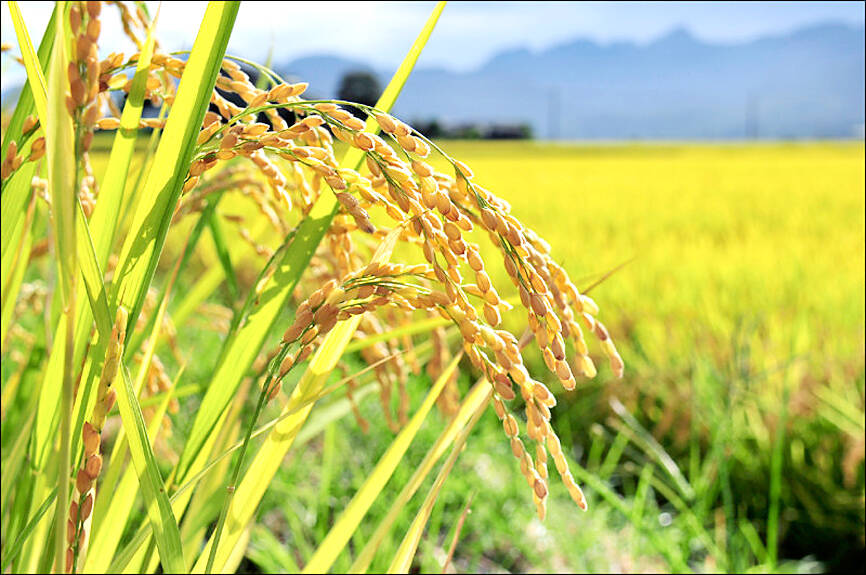Taiwanese scientists have created a genetically modified rice strain that contains 25 to 30 percent more vitamin B1 without diminishing yield, research project head Hsieh Ming-hsiun (謝明勳) said.
The research, which involves splicing genes that govern vitamin production in Escherichia coli with Taiwan’s indigenously developed rice variety Tainun 67, was published in The Plant Journal in November last year.
White rice, which is consumed as a staple food in most of East Asia, is produced by removing the bran and germ from the grain through polishing, said Hsieh, a research fellow at Academia Sinica’s Institute of Plant and Microbial Biology.

Photo: Taipei Times file
Unfortunately, the parts removed in the polishing process are also the main store of gluten and vitamin B1 in the grain, resulting in a loss of essential nutrition, he said.
Brown rice, which retains the bran and germs, is more nutritious than polished rice, but its rough texture is considered displeasing by most people, he said.
To improve public health and well-being, the research team headed by Hsieh sought to boost the vitamin B content in rice via genetic manipulation, he said, adding that the project took five years to complete.
A significant challenge that the team overcame was ensuring the designed crop had a high enough yield to make planting economically viable, he said.
Three years ago, a group of Dutch scientists had created gene-modified rice that contained two to three times the vitamin B of normal rice, but the variety’s poor yield prevented commercial success, he said.
The Academia Sinica team’s creation, which features an
identical yield to its parent variety, stores vitamin B1 in the grain itself, allowing the rice to be polished without losing nutritional value, he said.
Vitamin B1 deficiency could cause many conditions including swelling in the lower limbs, numbness, nerve damage, enlarged heart and digestive problems, Hsieh said, citing data from the Ministry of Health and Welfare.
Taiwanese for the most part are free of vitamin B deficiency and cultivating genetically modified crops is prohibited by law, but the rice the team designed could still be useful for poor countries with a rice-dominant diet, he said.
The team is continuing work to increase the variety’s vitamin content and palatability, he said.

An essay competition jointly organized by a local writing society and a publisher affiliated with the Chinese Communist Party (CCP) might have contravened the Act Governing Relations Between the People of the Taiwan Area and the Mainland Area (臺灣地區與大陸地區人民關係條例), the Mainland Affairs Council (MAC) said on Thursday. “In this case, the partner organization is clearly an agency under the CCP’s Fujian Provincial Committee,” MAC Deputy Minister and spokesperson Liang Wen-chieh (梁文傑) said at a news briefing in Taipei. “It also involves bringing Taiwanese students to China with all-expenses-paid arrangements to attend award ceremonies and camps,” Liang said. Those two “characteristics” are typically sufficient

A magnitude 5.9 earthquake that struck about 33km off the coast of Hualien City was the "main shock" in a series of quakes in the area, with aftershocks expected over the next three days, the Central Weather Administration (CWA) said yesterday. Prior to the magnitude 5.9 quake shaking most of Taiwan at 6:53pm yesterday, six other earthquakes stronger than a magnitude of 4, starting with a magnitude 5.5 quake at 6:09pm, occurred in the area. CWA Seismological Center Director Wu Chien-fu (吳健富) confirmed that the quakes were all part of the same series and that the magnitude 5.5 temblor was

The brilliant blue waters, thick foliage and bucolic atmosphere on this seemingly idyllic archipelago deep in the Pacific Ocean belie the key role it now plays in a titanic geopolitical struggle. Palau is again on the front line as China, and the US and its allies prepare their forces in an intensifying contest for control over the Asia-Pacific region. The democratic nation of just 17,000 people hosts US-controlled airstrips and soon-to-be-completed radar installations that the US military describes as “critical” to monitoring vast swathes of water and airspace. It is also a key piece of the second island chain, a string of

The Central Weather Administration has issued a heat alert for southeastern Taiwan, warning of temperatures as high as 36°C today, while alerting some coastal areas of strong winds later in the day. Kaohsiung’s Neimen District (內門) and Pingtung County’s Neipu Township (內埔) are under an orange heat alert, which warns of temperatures as high as 36°C for three consecutive days, the CWA said, citing southwest winds. The heat would also extend to Tainan’s Nansi (楠西) and Yujing (玉井) districts, as well as Pingtung’s Gaoshu (高樹), Yanpu (鹽埔) and Majia (瑪家) townships, it said, forecasting highs of up to 36°C in those areas